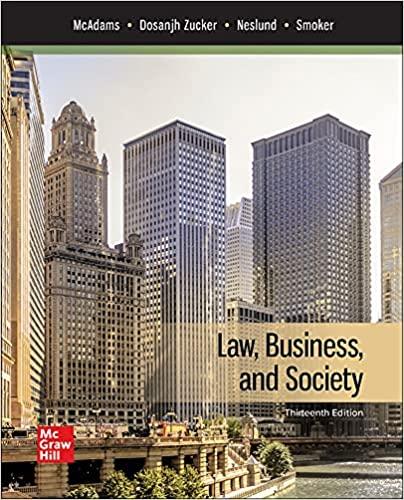Equilon Enterprises, LLC (Equilon) does business as Shell Oil Products. Equilons standard franchise agreement requires its franchisees,
Question:
Equilon Enterprises, LLC (“Equilon”) does business as Shell Oil Products. Equilon’s standard franchise agreement requires its franchisees, Shell and Texaco gasoline stations, to use Equilon to process credit-card transactions. In addition to payment for sales of petroleum products, Equilon allegedly gets
(1) Transaction fees associated with the processing.
(2) Some kind of unspecified “kickback” from unidentified banks that process the transactions, or both.
Rick-Mik Enterprises, Inc., Mike M. Madani, and Alfred Buczkowski (collectively “Rick-Mik”) are Equilon franchisees who on behalf of themselves and other, similarly situated Equilon franchisees allege that Equilon violated antitrust laws by illegally tying two distinct products (the franchises and the credit-card processing services). Rick-Mik contends franchisees could pay lower transaction fees from others for credit-card processing. . . .
Questions
1. a. Identify the purported tying and tied products in the RikMik case.
b. Explain how Rik-Mik attempted to establish that Equilon had market power in the tying product.
2. How does Rik-Mik claim to have been harmed by the alleged tying arrangement?
3. Why did the court reason that a franchising contract ordinarily cannot, by itself, be the basis for an antitrust claim?
4. Who won this case and why?
5. Recently a group of California consumers sued several television networks and cable and satellite distributors, including NBC, Fox, and Time Warner Cable. The defendant television networks sold television programming to the defendant cable distribution companies in bundles rather than as individual channels.
The distributors, in turn, sold to consumers in those prepackaged bundles or on a “tier” basis. The plaintiff consumers claimed the practice of offering subscriptions only in bundles was unlawful under the Sherman Act.
a. Explain the nature of the alleged Sherman Act violation.
b. Who won the case? Why? See Brantley et al. v. NBC Universal, Inc. et al., 675 F.3d 1192 (9th Cir. 2012); cert. denied, 133 S.Ct. 573 (2012).
6. Chrysler included the price of a sound system in the base price of its cars. Chrysler’s share of the auto market at the time was 10 to 12 percent. Chrysler did not reveal the “subprice” for the sound systems. Independent audio dealers objected on antitrust grounds. Explain their claim. Decide. See Town Sound and Custom Tops, Inc. v. Chrysler Motor Corp., 959 F.2d 468 (3d Cir. 1992), cert. denied, 113 S. Ct. 196 (1992).
Step by Step Answer:

Law Business And Society
ISBN: 9781260247794
13th Edition
Authors: Tony McAdams, Kiren Dosanjh Zucker, Kristofer Neslund, Kari Smoker





